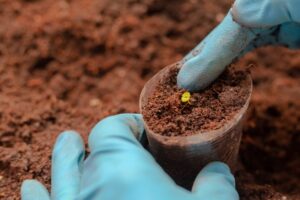Preserving the land for future generations is a priority for farmers, especially for intergenerational farms. Offering children and grandchildren a proud legacy and a profitable business starts with ensuring sustainable farming practices to ensure them future productivity.
From generation to generation, long-term farm success is traced back to soil health in the USA and how it has been managed. In this blog, we shall explore how a lack of efficient soil management practices impacts a farm’s profitability now and in the future. It is imperative to know how to measure and monitor soil health and keep the legacy alive.
Importance of Soil Health in the USA on Agriculture:
Soil health is the ability of the soil to perform as a living ecosystem, offering essential ecosystem services. These include nutrient cycling, water retention, and pest control. The primary components of soil health are a diverse population of mechanisms, organic matter, and soil structure.
For the crops, healthy soil enables stronger roots, better water filtration, and better nutrient uptake, causing better growth and yield. For livestock, healthy soil offers the nutrients, water, and structure needed for forage growth. This supports the nutritional needs of animals.
Soil health also plays a crucial role in the health of the environment. With the ability to store carbon, healthy soil helps in reducing climate change. Also, soil health practices help improve water quality and biodiversity, creating a sustainable and resilient ecosystem. Overall, it is imperative to maintain healthy soils to ensure productive and profitable intergenerational farming for future generations. Also, it helps in preserving the planet.

Source: Freepik
Improving Soil Health for Future Generations:
Farming families should opt for sustainable farming practices to improve soil health in the USA and preserve it for future generations. One of the best ways to do that is through cover crops. Cover crops are planted within cash crops to protect the soil from erosion and add organic matter to the soil.
Reducing tillage practices also helps in improving and preserving soil health. To reduce tillage, it is crucial to use minimal tillage to prepare the soil for planting. This helps in reducing soil erosion and maintains soil structure.
Rotational graze on the ranch, where the livestock is shifted from one piece of fenced land to another, can also help protect the soil from compaction. This leads to a runoff and destroys topsoil. By rotating the grazing areas, the animals can be moved around the farm without any major stress to any one specific area of the landscape.
Sustainable biological inputs that work perfectly well with the soil’s biology and not against it can also help farmers maintain the health of the soil while ensuring positive business results. These include reducing input costs and increasing crop yield. The question is, how can farmers work with the soil’s biology in the first place?
Biological soil testing and monitoring the farm’s progress over the years will help ensure the conditions and keep them favorable to plant growth and animal health. If you are not testing the soil’s health, you are simply making a guess. To ensure profitability from the farm, it is imperative to remove the guesswork, offering farmers the tools to understand and interpret soil health and functionality.
Importance of Soil Health in Integrational Land Ownership:
Integrational land ownership helps preserve soil health by offering a long-term perspective on land management. Multi-generational farms face challenges like the pressure to enhance short-term profits, which can lead to neglecting the soil. However, when the land is passed through generations, the focus is shifted to preserving it for its descendants. This perspective has introduced sustainable farming practices that promote soil health and long-term soil equity. Also, intergenerational landowners offer an opportunity to share knowledge and communicate about the crucial aspects of soil health and biology.
In Conclusion:
Integrational land ownership is a dynamic process where every succeeding farmer’s practices play a vital role in determining the future performance of the family farm. To ensure the productivity of the farm for future generations, farmers can consider adopting practices that focus on soil health. Ensuring the effectiveness of these practices will help the farmers understand the impact of their decisions on the future of their farms. To ensure proper soil health, you have to get the soil tested. Visit - https://soiloptix.com/ for accurate soil analysis and information.
